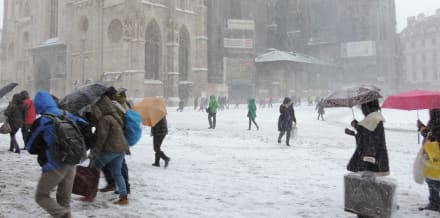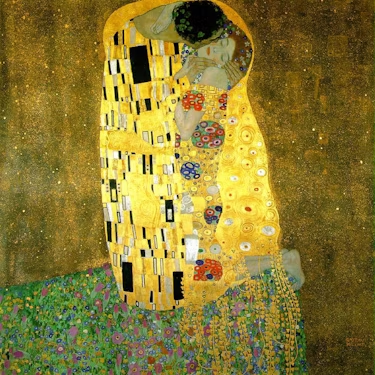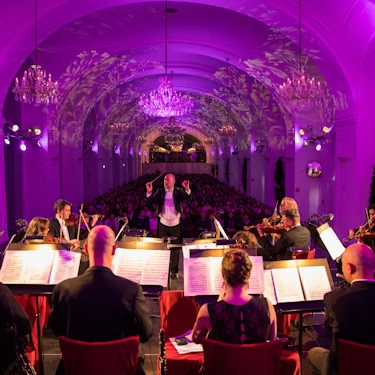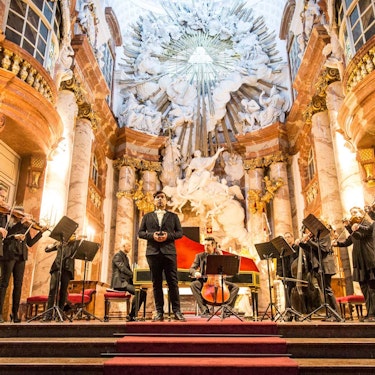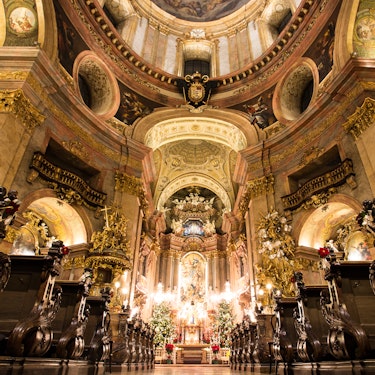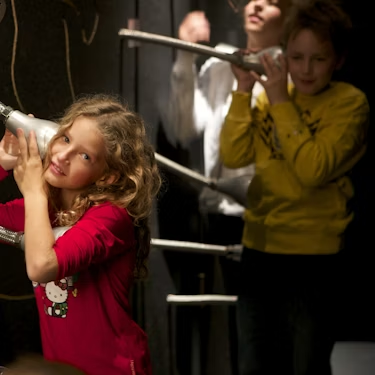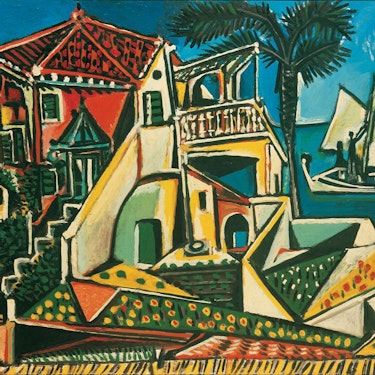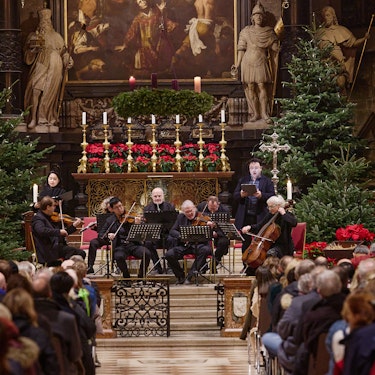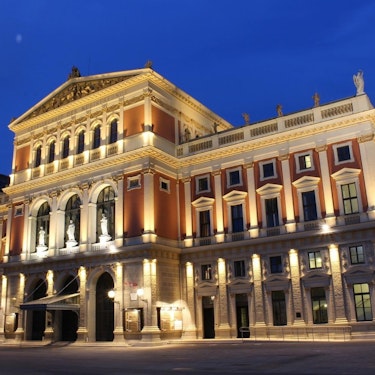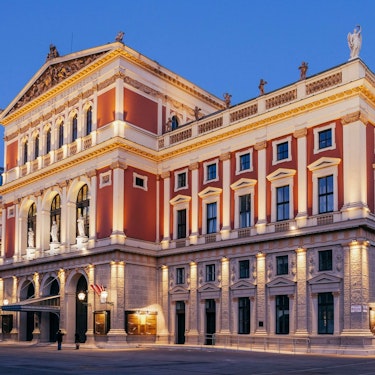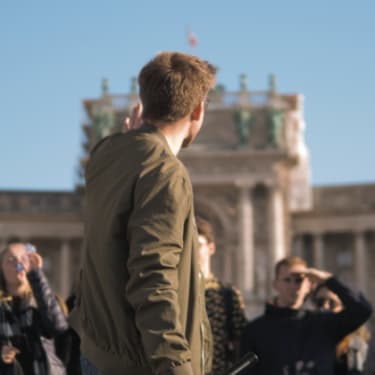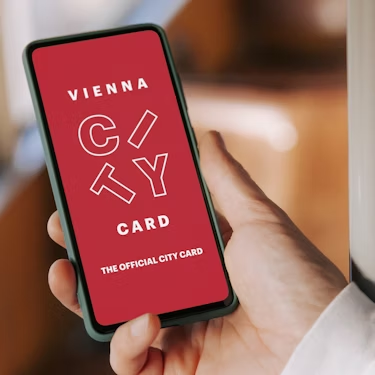More about: 11 Things to Do in Vienna in the Winter
If there's one time of year when Vienna has a special colour, it's winter, when white covers the whole city. There are always things to do in Vienna and in the coldest months of the year, although sometimes it can be difficult to be outdoors, there are very special events that you can't wait to celebrate.
Christmas is the one that opens the season, but don't think that's all, because just after that come the balls and gala concerts, Carnival and snow days where you can get active or enjoy the cosy Viennese cafés. Whatever you choose, don't be afraid of the cold weather, because you will feel the warmth of this city. Do you want to start planning your trip to Vienna in winter?
1. Visit Schönbrunn Palace and its snow-covered gardens
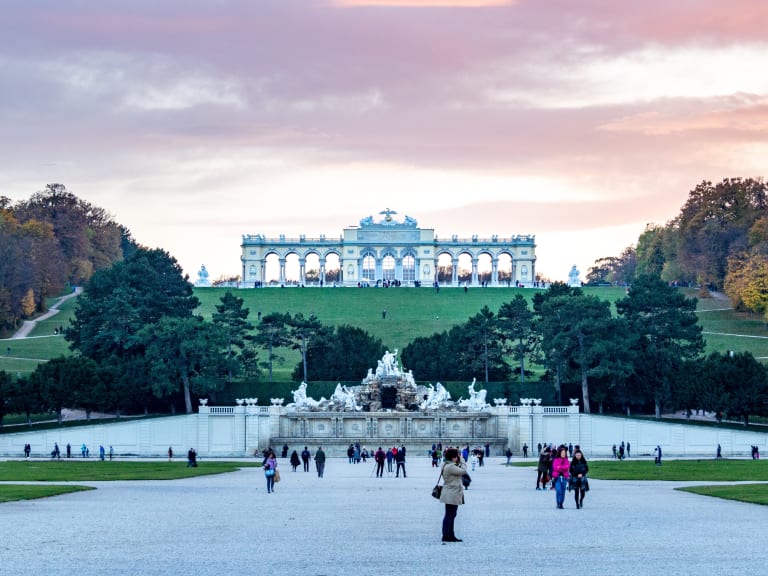
You can't imagine a winter in Vienna without snow. Although you can see it covering the whole city, there is one place that becomes even more magical when covered in a blanket of white: Schoenbrunn Palace. It is one of Vienna' s finest palaces and served as a summer home for the Habsburgs. A stroll through the Schoenbrunn Gardens (free of charge) is also worthwhile, even if you are a little chilly.
Did you know that Schoenbrunn was one of the palaces where Sisi spent most of her time? The figure of this empress will accompany your visit, during which you will be able to see her personal objects and crockery. To discover all the secrets of this place, my recommendation is to book a guided tour of the interior of Schönbrunn Palace. You won't regret it, as there is so much to see.
Interesting facts
- When: all winter
- Where: Schoenbrunn Palace
- Price: admission to the gardens is free and to the Palace approximately 18€.
2. Experience the start of Vienna's winter concert season

The sub-zero temperatures of the Viennese winter may be responsible for the fact that this is the season for balls, concerts and opera performances. It is clear that music and the warmth of an indoor venue help to cope better with the cold. If you get the chance, I recommend going to a classical concert in Vienna during this time of year. They cost around €30 and it will be like being transported back to the 19th century while enjoying your Mozart concert tickets in Vienna or other musicians, for example.
Of all the shows taking place, you'll probably want to get tickets for the Vienna New Year's Concert. But if you feel like attending an accessible concert or ball, you can check the programme of the Vienna Musikverein and, of course, dress up for the occasion.
Interesting facts
- When: January and February
- Where: Vienna State Opera and other Vienna venues
- Price: approximately €30
3. Shelter from rain and snow in the museums

Rain (or even snow) is a frequent occurrence in the Vienna winter. There is nothing we can do to stop them, but we can take shelter from them. One of my favourite plans for this is to enter one of Vienna's best museums. Vienna is a city with a lot of history and culture, and one way to get close to them is through its museums. It's difficult to visit them all, so I've made a selection of the ones I wouldn't miss. If you want to visit several museums, my advice is to buy your Vienna Pass:
- Albertina Museum: you can't go to Vienna and leave without visiting the Albertina Museum, one of the most renowned museums in the city and in Europe. Its collections include paintings by painters such as Picasso, Renoir and Miró.
- Vienna Museum of Art History: the fact that it is the most visited museum in Vienna is no coincidence; more than a million people visit it every year and all of them are amazed by the great collection that belonged to the Habsburgs. I recommend that you buy your tickets for the Kunsthistorisches Museum, Vienna's Museum of Art History, in advance.
- Karlsplatz Museum: Although it is not as big or as eye-catching as the rest, I think it is the perfect place to learn about the history of the city. Its rooms will take you on a tour that will take you from prehistoric times to the 19th century.
Interesting facts
- When: throughout the winter
- Where: different locations depending on the museum
- Price: approx. €20 per museum (Vienna Pass can be purchased for around €80)
4. Get to know Vienna without being cold on a sightseeing bus
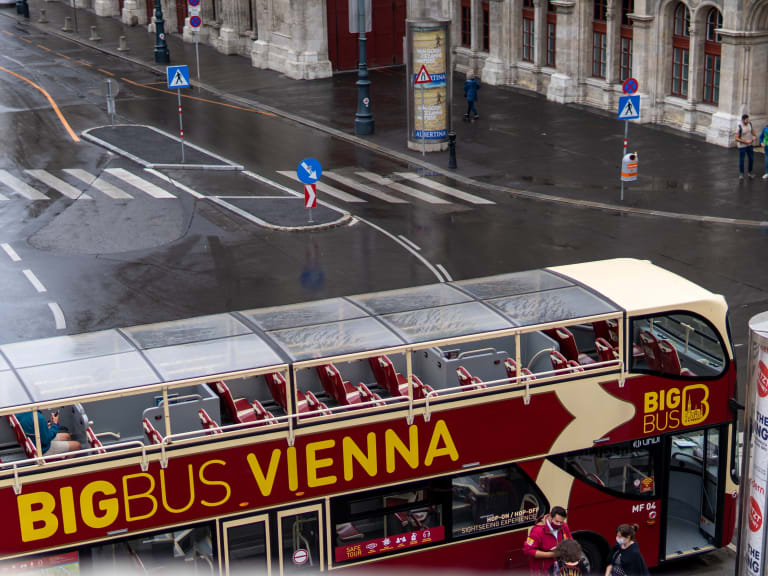
On some winter days in Vienna, temperatures drop below freezing, making walking or being outside impossible. However, this doesn't mean you have to give up part of your trip or stay in your hotel room. In fact, there is an alternative to escape the cold without missing out on the city's main attractions: book tickets for a Vienna sightseeing bus.
The great advantage of these buses is that, unlike public transport, they make strategic stops at the most important places in Vienna, such as the Music House or the Opera House. You can go from one place to another and get off at the ones you are most interested in. If the weather is bad and you prefer not to make any stops, no problem, the bus is heated and has a guide.
Useful information
- When: throughout the winter
- Where: different stops all over the city
- Price: approximately €30
5. Take a tour around Vienna

We know that the city of Vienna is attractive on its own, but if your trip lasts several days you can take advantage of a day to make an excursion in its surroundings because you will be surprised! Its palaces, valleys, castles and nearby towns are well worth a visit. Here is a selection of the best ones:
- Book your trip to the Wachau from Vienna: this is one of the most famous wine tourism spots in the area. The Wachau valleys and the villages in the area are also a UNESCO World Heritage Site and you can taste local wines. If you want to extend your visit, you can also book an excursion to the Wachau, Melk Abbey and the Danube valleys from Vienna. With the help of a local guide, you can explore the forests, castles and stunning natural scenery of the countryside and end your day on a cruise on the Danube.
- Book your excursion to Hallstatt from Vienna: with this professionally guided tour you will get a panoramic view of the Alps and see some of the town's most iconic sights.
- Book your excursion to Budapest from Vienna: a city that is definitely worth getting to know in depth. You will visit some of its most emblematic places such as Heroes' Square, the Parliament, or the Fisherman's Bastion and St. Matthias Church with a guide; and you will also enjoy some free time in the city to browse, take pictures...
- Book your excursion to Bratislava from Vienna: you can visit the famous Michael's Gate, Maximilian's Fountain or St. Martin's Cathedral with a professional guide. You will also have free time to buy souvenirs or have a coffee and, as a last activity, the excursion includes a panoramic cruise on the Danube River back to Vienna.
Interesting facts
- When: January and February
- Where: around the city
- Price: between 90€ and 135€.
6. Winter sports in Vienna

The Viennese love the cold and the snow, so they don't hesitate to get out their sledges, skates or skis and look for places to use them. They often go to the city's own parks to do this, so you can join them and take the opportunity to get to know Vienna in a unique and entertaining way.
- Ice skating at Ice World Vienna: in this park located in front of the City Hall you will not only skate on ice in a single enclosure, but you can also take one of the icy streets that go into the park.
- At the Wiener Eistraum: you can enjoy curling matches at the adjacent rink. This sport consists of "sweeping" the ice to help a plate slide across it and reach a specific area.
- Skiing in the city of Vienna: in Vienna this is possible when the cross-country ski slopes are set up on the banks of the Danube. It has to snow a lot for this to happen, but it is a unique experience.
- Hohe Wand Wiese: these 400-metre slopes may be small, but the good thing is that they are very close to the city (in the Wienerwald forest).
Interesting facts
- When: all winter
- Where: Wiener Eistraum (ice skating) and Hohe Wand-Wiese (skiing)
- Price: free admission (skate rental €2,5 and ski rental €15/day)
7. Experience Christmas in Vienna
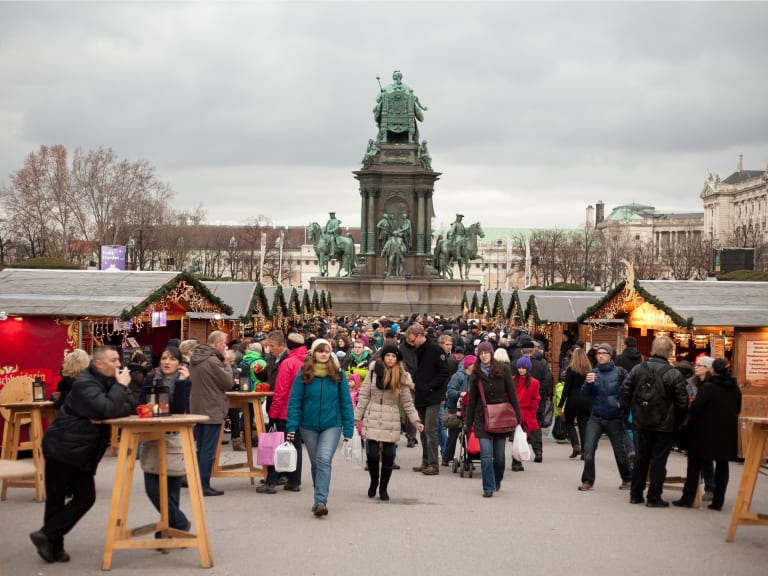
Christmas is one of the celebrations that certainly marks the winter season. The good thing is that the Austrian capital extends the festivities from the beginning of November until the end of December, so there are plenty of things to do during Christmas in Vienna. The city's Christmas markets are famous and you'll find everything from Viennese sweets to beautiful handicrafts to take home as souvenirs.
These markets can be found all over the city, although one of the best known and most popular is the Rathaus Markt, which is located in the area in front of Vienna's City Hall. However, you don't have to go to a Christmas market to experience Christmas. My advice, especially if you are overwhelmed by the large crowds, is to walk around the city when it starts to get dark and the lights illuminate everything.
Interesting facts
- When: December
- Where: all over the city
- Price: free admission
8. Celebrate Winter Carnival in Vienna

During the months of January and February Vienna celebrates its Carnival. You may think it's too early in the year, but it's very common in German-speaking countries. The name is Fasching and although the exact dates vary from year to year. Various traditional events are organised, so it's the perfect occasion to get a taste of the city's culture.
Being a Carnival, be prepared to see people dressed up in costumes on the streets, especially on the final day, Faschingsdienstag. Locals bring out their loudest, most original and colourful costumes, which were once used to honour and thank the gods. And don't forget the Faschingskrapfen, the apricot jam-filled doughnuts that are mainly eaten around this time of year.
Interesting facts
- When: January and February
- Where: All over the city, especially in the Währing and Döbling districts.
- Price: free admission
9. Warm up in Vienna's cafés

Is there a better way to warm up than a hot coffee and a freshly brewed sweet? I don't think so, and the Viennese seem to think so too, because one of their favourite wintertime plans is to spend the afternoon in the city's majestic cafés. Coffee and the famous Sacher Cake, or any other dessert for that matter, are joined by imperial décor and live music. In fact, there is a word to describe this atmosphere: "gemütlichkeit", which could be translated as "cosy".
You can't miss a slice of Sacher Cake, the famous chocolate cake, or Apfelstrudel, which combines baked apple with a rich pastry made of flour and butter.
Interesting facts
- When: throughout the winter
- Where: all over the city
- Price: free admission (approx. €5 for a drink)
10. Try the famous Maroni, their typical roasted chestnuts.

When you walk around Vienna in winter you will smell chestnuts. Don't be surprised, it is very common in the colder months for Maroni to be sold, without doubt the best way to warm hands and stomachs. Each cone (with about 6-9 chestnuts) costs about 3€/4€.
It is estimated that there are around 200 stalls all over the city selling roasted chestnuts, so you'll find it hard to resist buying a few. The tradition dates back to the Middle Ages, as chestnuts were part of the Austrian diet. Nowadays they are eaten in winter, especially during the month of December and, if I have to give you a piece of advice, buy those that you see have been roasted over charcoal instead of gas, they are tastier!
Interesting facts
- When: all winter long
- Where: there are stalls all over the city
- Price: about 3€-4€ a portion
11. Take photos of Snowfall from St Stephens Tower

If it's already fascinating to see Vienna in winter from the street, with the snow covering it completely, imagine what it's like from the heights. The good news is that you don't need to imagine it - you can see it from the top of the south tower of St Stephens Cathedral The views are incredible, but the photos are even better. To go up, you will have to pay a specific entrance fee (approximately 6€).
Stephansdom is located in the centre of Vienna, right on Stephansplatz. It is known for its Tiled Roof, which is made up of more than 250,000 tiles. You can go inside for free or pay to see the vaults and artwork in more detail. However, for me, the really interesting thing is to climb its south tower, whose 65-metre height gives you an incredible panoramic view over Vienna.
Interesting facts
- When: all winter
- Where: St Stephens Cathedral
- Price: approx. 6€ (to climb the tower)
Vienna's winter weather

I'm sorry to say that if you travel to Vienna in winter, you're going to be cold. Temperatures usually drop below freezing, but you will be able to enjoy the snow and the fairytale-like appearance of the city. To avoid freezing, my recommendation is to take advantage of the central hours of the day, when the sun is at its peak, for open-air visits.
The good news is that the cold and precipitation attract fewer people, especially during the month of January in Vienna, so you can get around the city without crowds. This also means that hotel and flight prices are cheaper.
What to pack for Vienna in winter

When packing for your trip to Vienna, my advice is to pack the warmest items from your wardrobe: coats, jumpers, gloves, scarf, hat... If you don't have one, buy a thermal T-shirt, as they are usually the solution for the coldest days.
As snow is quite likely, remember to pack shoes that are not only comfortable but also waterproof.
Have you got everything ready? Make a note of the events you don't want to miss and try to go to as many as you can, you won't regret it!
